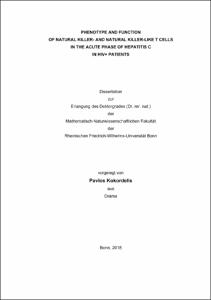Phenotype and function of natural killer- and natural killer-like t cells in the acute phase of hepatitis c in hiv+ patients

Phenotype and function of natural killer- and natural killer-like t cells in the acute phase of hepatitis c in hiv+ patients

| dc.contributor.advisor | Spengler, Ulrich | |
| dc.contributor.author | Kokordelis, Pavlos | |
| dc.date.accessioned | 2020-04-25T08:59:15Z | |
| dc.date.available | 2020-04-25T08:59:15Z | |
| dc.date.issued | 03.07.2018 | |
| dc.identifier.uri | https://hdl.handle.net/20.500.11811/7584 | |
| dc.description.abstract | Among HIV+ patients an increasing number of people acquire a co-infection with the hepatitits C virus (HCV). Compared to HCV mono-infected patients, the HCV coinfection in HIV+ patients leads to accelerated rates of fibrosis and liver associated morbidity and mortality. Regardless of the pre-existing HIV infection a small proportion of the co-infected patients clear their acute HCV infection naturally in the early stage before establishing a chronic infection. In our studies, we investigated the role of natural killer cells (NK cells) as well as natural killer-like T cells (NK-like T cells) in modulating outcomes of acute hepatitis C infection in HIV+ patients. Patients with chronic HCV/HIV co-infection, HIV mono infection, as well as healthy individuals were studied as controls. NK- and NK-like T cells were studied phenotypically and functionally by flowcytometric analysis. Interferon-gamma (IFN-γ) secretion, degranulation (CD107a) and anti-HCV activity were studied using the Huh7- HCVreplicon cells system. NK- and NK-like T cell frequency did not vary significantly with respect to outcome of acute HCV infection. Nevertheless, in vitro NK cells from patients with a self-limited course of HCV infection were able to inhibit HCV replication to a greater extent than NK cells from patients who developed chronic course of infection. Functional analysis showed a positive correlation between NK cell anti-HCV activity and IFN-γ secretion whereas no such observations were made with respect to NK cell degranulation. Blocking of IFN-γ suggested a key role for NK cell-mediated inhibition of HCV replication. In line with this, NK cells from patients with a self-limited course produced significantly more IFN-γ than NK cells from patients with a chronic course. Further we found that high expression of NKp46 and NKG2D defines NK cell subpopulations which display a robust anti-HCV activity and are able to modulate outcomes of acute HCV infection favoring spontaneous clearance via IFN-γ secretion. Blocking of these receptors significantly reduced antiviral NK cell activity. Regarding CD3(+)CD56(+) NK-like T cells from healthy individuals, we found that stimulation with IL-12/IL-15 significantly increased efficacy to inhibit HCV replication in vitro via IFN-γ secretion. In line with our previous observations from the NK cell analysis, blocking of IFN-γ decreased anti-HCV activity of NK-like T cells. However, no correlation was found between degranulation and inhibition of HCV replication. Instead, we found NKlike T cells from HIV+ mono infected patients to display a significantly impaired IFN-γ production and consequently to show significantly worse capacity to inhibit HCV replication than healthy controls. In conclusion, our results demonstrate a critical role of NK cell subpopulations and their capacity to modulate IFN-γ production as a key factor for a robust anti-HCV response. We could show that NK cell-mediated IFN-γ production was associated with spontaneous clearance of acute hepatitis C in HIV+ patients. Despite the fact that NKlike T cells also possess the ability to inhibit HCV replication in an IFN-γ-dependent manner, their capacity to produce IFN-γ seems to be negatively affected by HIV infection, so that they can contribute only insignificantly to the clearance of hepatitis C virus in HIV infected patients. | en |
| dc.language.iso | eng | |
| dc.rights | In Copyright | |
| dc.rights.uri | http://rightsstatements.org/vocab/InC/1.0/ | |
| dc.subject | HIV | |
| dc.subject | HCV | |
| dc.subject | NK cells | |
| dc.subject | NK-like T cells | |
| dc.subject.ddc | 570 Biowissenschaften, Biologie | |
| dc.title | Phenotype and function of natural killer- and natural killer-like t cells in the acute phase of hepatitis c in hiv+ patients | |
| dc.type | Dissertation oder Habilitation | |
| dc.publisher.name | Universitäts- und Landesbibliothek Bonn | |
| dc.publisher.location | Bonn | |
| dc.rights.accessRights | openAccess | |
| dc.identifier.urn | https://nbn-resolving.org/urn:nbn:de:hbz:5n-51132 | |
| ulbbn.pubtype | Erstveröffentlichung | |
| ulbbnediss.affiliation.name | Rheinische Friedrich-Wilhelms-Universität Bonn | |
| ulbbnediss.affiliation.location | Bonn | |
| ulbbnediss.thesis.level | Dissertation | |
| ulbbnediss.dissID | 5113 | |
| ulbbnediss.date.accepted | 04.06.2018 | |
| ulbbnediss.fakultaet | Mathematisch-Naturwissenschaftliche Fakultät | |
| dc.contributor.coReferee | Förster, Irmgard |
Files in this item
This item appears in the following Collection(s)
-
E-Dissertationen (4446)




